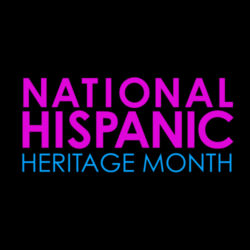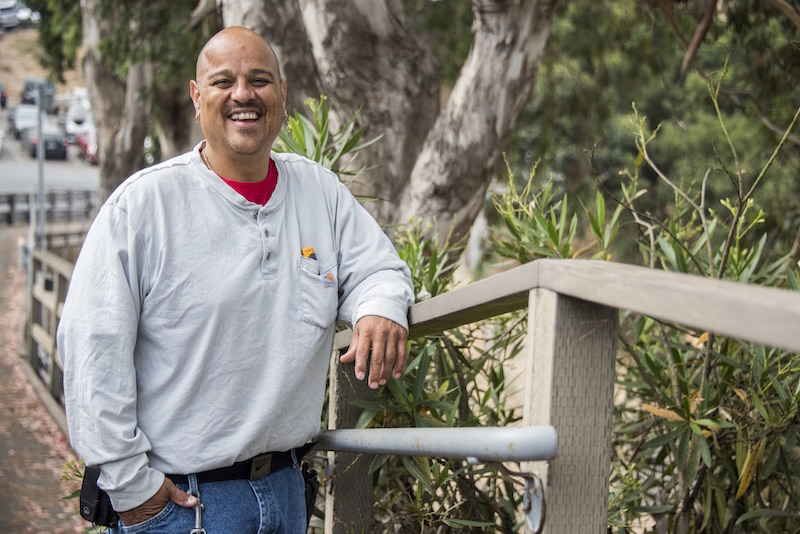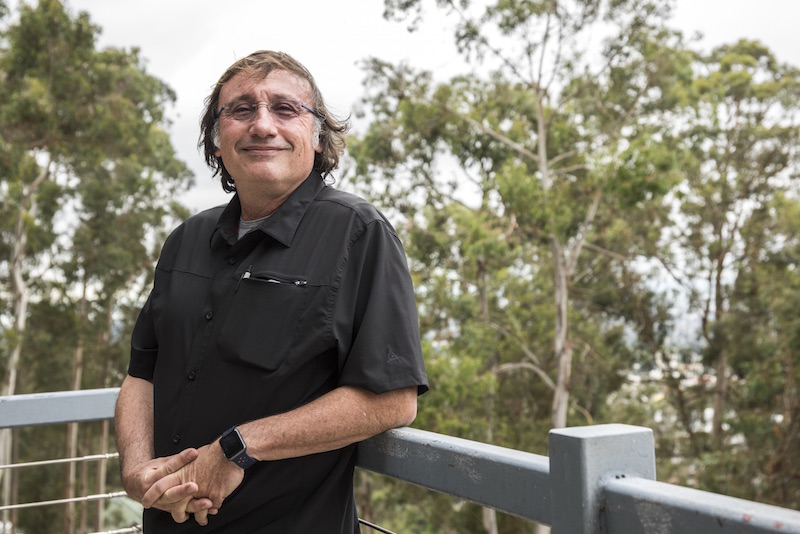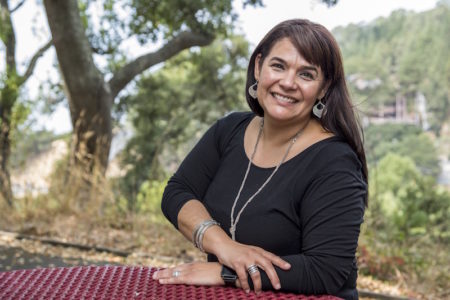A Life of Ups and Downs Before Landing at Berkeley Lab
 When Primo Caliz was growing up all over the United States, he never dreamed he’d end up at Berkeley Lab.
When Primo Caliz was growing up all over the United States, he never dreamed he’d end up at Berkeley Lab.
Both of Caliz’s parents grew up in poverty in Puerto Rico, then immigrated to the U.S. as young adults in search of a better life. Caliz’s dad was forced to grow up fast after his father passed away, and as the oldest child, he was expected to provide for his mom and siblings. Job opportunities in the United States allowed him to do that. Caliz’s mom was only 18 when she married his father, and they started a family in New Jersey.
The couple moved to California and had four children before domestic violence split the family apart. “There were no domestic violence laws or protections in place back then,” says Caliz. “My mom had to rely on church and government assistance to get us out of a bad situation.”
Caliz and his siblings were relocated to a housing project in Denver, Colorado with his mom, a situation that he says was worse than living with domestic violence. “We lived in poverty and my mom was always sick, in and out of the hospital often,” says Caliz. “She passed away when I was 15, and I wasn’t ready to be out in the world on my own, but there I was.”
Caliz went to four different high schools in four different states throughout his teens, relying on government assistance for most of his needs. “I was always in trouble because I was always the new kid,” he says. “My clothes didn’t fit right, I was poor, and the kids picked on me.”
After a few tumultuous years on his own, Caliz faced the choice of being put into a government-run group home or living with his father, who had gotten back in touch with Caliz and his siblings by that point. He chose California, but that didn’t work out well either—his stepmother saw him as a bad influence on her own kids and made things difficult for him.
Caliz found himself out on the streets alone again after graduating high school and starting college. “At that point, I got involved with the wrong people and the wrong things, and only ‘woke up’ again when I was 30,” he says. “My life has been a real roller coaster ride.”
Caliz says he knew he needed to turn his life around, and he caught a big break when he landed a job with Fluoresco as a lighting technician. Through Fluoresco, he ended up working on a contract at Berkeley Lab, where he was successful and enjoyed working. Years later, in 2010, Caliz got a call from the Lab’s Facilities Division out of the blue—his name came up when there was an opening for a lighting technician. He was hired at the Lab permanently and has been here ever since.
“It’s felt good to be stable and be able to provide that stability for my own kids, something I never had,” he says.
Caliz has a 25-year-old daughter in college and 2- and 4-year-old sons. He still speaks Spanish to his kids so that they’ll understand the language, which is something Caliz really values—his mother always insisted that he and his siblings speak Spanish at home with her when they were young.
Caliz cooks a lot of traditional Puerto Rican food at home, dishes he learned to make from his mother. He’s visited Puerto Rico only once and would love to go back again. He has a huge extended family there and across the U.S.
He finally heard from some of his family members in Puerto Rico on Monday after Hurricane Maria hit the island last week. A few of his family members are police officers, so they were able to use a satellite phone to call and let Caliz know that they’re all doing OK, their houses survived the storm, and they’re surviving by living off the land for now—fortunately they have lots of fruit trees and other crops. Caliz says they’re accustomed to gaps in electrical power—it’s not an unusual event in Puerto Rico—but what’s very difficult is the lack of clean drinking water.
Looking back on his own life Caliz is philosophical. “Even though my life was pretty hard when I was younger, it did give me some valuable skills,” he says. “I really learned people skills through all I went through, all the different places I lived. I can strike up a conversation with anyone, and that’s definitely been an asset at work and out in the world.”
–by Keri Troutman
Chasing Gamma Rays From Buenos Aires to Berkeley
As a student in Buenos Aires, Argentina, Augusto Macchiavelli of Berkeley Lab’s Nuclear Science Division liked to draw and had contemplated becoming an architect. But that all changed during a high school chemistry class. “The first time our teacher discussed the structure of atoms, I immediately knew that was what I wanted to do,” he says.
So after graduating from high school, he completed a bachelor’s degree in physics. He was working toward his doctorate in physics at the Balseiro Intitute in Bariloche, Argentina when, in 1981, his advisor suggested that he work with nuclear chemists Richard M. Diamond and Frank Stephens at the Lab’s 88-Inch Cyclotron. Saying “yes” was a no-brainer. “When I was growing up, we saw the United States as this fantastic country,” says Macchiavelli. “I was lucky to come here.”
He had learned English in high school and college, but speaking it every day while working in the U.S. took some time getting used to. He was fluent in the universal language of physics, however, and in 1987, three years after returning to Argentina to complete his doctorate, Diamond and Stephens brought him back to the Lab to serve as their postdoc. During this time, he contributed to the technical aspects of a proposal to build a new instrument that would later be known as the Gammasphere, a powerful spectrometer used to study gamma rays after the fusion of heavy ions.
When his postdoc appointment ended a year later, he returned to Argentina once again, and wasn’t sure if he would return to the United States. He had found a job working on several aspects of nuclear physics at the TANDAR Laboratory in Buenos Aires, and had firmly settled back into the close-knit ties of his extended family.
But one day, in 1992, he got a message from Stephens. The Department of Energy’s Office of Nuclear Physics had approved their proposal for the Gammasphere. They would need technical scientists like Macchiavelli to help build it, and he was offered one of the staff positions. “Being offered a full-time position at Berkeley Lab was a dream come true,” he says. “When you’re in an environment where you can run into Nobel laureates like Glenn Seaborg or Luis Alvarez, it makes you feel good.”
After discussing the job offer with his wife, they agreed it was a career opportunity he couldn’t pass up, even if it meant they’d have to move thousands of miles away from their parents. “Argentina had a very strong nuclear physics program, but in terms of what I could do in the U.S., it was very difficult to say no,” he says.
With their three daughters, they soon settled into their new life in the Bay Area, and much has happened since then. He witnessed the Gammasphere’s commissioning in 1995, and in 2002, helped to finalize its move to Argonne National Laboratory. He and his wife have regularly returned to Argentina to visit family, but it is the Bay Area, not Buenos Aires, that they now call home.
Today, this former postdoc from Bariloche leads the Nuclear Structure Group in the Nuclear Science Division, and serves as the technical director of the gamma-ray detector GRETINA (Gamma-Ray Energy Tracking In-beam Nuclear Array).
Macchiavelli feels indebted to his parents and all his family who supported his decision to move to the U.S., and to his grandparents as well, working-class Italian immigrants who turned a mom-and-pop Italian deli into a successful business. “I’m really proud to be an American who was born in Latin America,” he says. “There’s a saying in Argentina, ‘Hacer la América’ or ‘Make it in America.’ My parents and grandparents worked hard to make it in South America. And because the U.S. welcomed me, I had the resources to make it as a nuclear physicist in North America.”
–by Theresa Duque
With Cecilia Tamayo, Nothing Gets Lost in Translation
In the summer of 1989, Cecilia Tamayo of the Lab’s Human Resources Division was just a schoolkid when she, her mother, and older sister emigrated from Monterrey, Mexico, to Berkeley, California.
The transition to life in America wasn’t as hard as it could have been, Tamayo says, because she and her sister had been taking English classes while attending an all-girls Catholic school in Monterrey. But starting school in a new country was tough nonetheless. “At the time, the Spanish-speaking population in Berkeley was small, and at Berkeley High, it was even smaller,” she recalls. “We were reminded that we were in America now, and that in America, people speak English, not Spanish.”
By the time she was a junior at Berkeley High, Tamayo’s years of working hard to turn a foreign language into her own paid off: Her counselor placed her in non-ESL classes, and she got accepted into San Francisco State University.
Soon after her freshman year at SF State, however, she had to put her college dreams on hold. She was married now, and had a family to take care of. She tried to juggle it all, but it was hard.
And her mother, who never had the opportunity to formally learn English, still needed her too. Ever since she was a teenager, Tamayo had accompanied her mother to doctor’s appointments, learning early on how to translate medical terms into Spanish. “For bilingual people from other countries, it’s a given that you’re going to be your parents’ translator,” she says.
It never occurred to Tamayo that her language skills could be turned into a career until she accompanied her brother-in-law to a workers’ comp medical office in Oakland. Like her mother, he didn’t speak English and needed Tamayo to translate.
By that point, the Hispanic population in the East Bay was growing, and there was a need for employees who were fluent in both English and Spanish, she says. At the end of her brother-in-law’s appointment, “The surgeon offered me a job as a translator!”
Tamayo thanked him but declined the offer; her oldest daughter was only two years old at the time, and she also had a new baby girl, just six months old. But as destiny would have it, she found work a couple of years later at a workers’ comp clinic that had an urgent need for a translator due to its high number of Spanish-speaking patients.
Through word of mouth, she learned about Berkeley Lab, and in 2006, began working in the Environment, Health & Safety Division’s Health Services office, where she served as an administrative assistant for 10 years. During her time there, her bilingual skills and kind demeanor proved yet again to be an asset. “At the Lab, there’s a good number of Hispanic employees who speak English as a second language,” she says. “They need someone who can explain in their own language what the nurses or doctors are doing. But that’s what anybody would want: to be comforted when you’re hurting, regardless of what language you speak.”
Today, Tamayo balances her full-time schedule as a Human Resources benefits assistant with taking classes toward a degree at Berkeley City College. Her bilingual skills still come in handy at the Lab, and she’s passed on the importance of being fluent in both Spanish and English to her children. “My husband and I try to speak Spanish to them at home,” she says. “It’s their culture. And because they’re bilingual, they can help my mom and husband’s mom too.”
–by Theresa Duque




Great stories and very enjoyable to read about these wonderful Lab employees. Especially enjoyed the article about Primo.
These are such engaging stories, a pleasure to read. Thank you all for sharing your struggles and success. With each personal account, we humanize the Lab, and show ourselves to be more alike than different. Identity gives us purpose and strength, and while we share it, it is also uniquely ours.
Peace+Love,
Amanda
You will not meet a more friendly, hard working person than Primo!
Agreed! One of the 1st people I met at LBL,& a nice guy to know.
Thank you for sharing your story Cecilia!
Great story and a Great Lady!!
What a wonderful history lesson of Cecilia!! I have always adored her and just love hearing about her background prior to coming here to California!! We have worked together since she started here and she is truly an asset to the Laboratory in every way!!!
Glad to see this story!! Yay Cece!!
Great story! I interacted with Cecilia a lot when she was at Health Services, and she was always prompt and efficient. So nice to learn some of her family history.
Felicidades Ceci!!!!
A wonderful article about an equally wonderful person!
Good to hear the stories and voices of the employees at the lab.